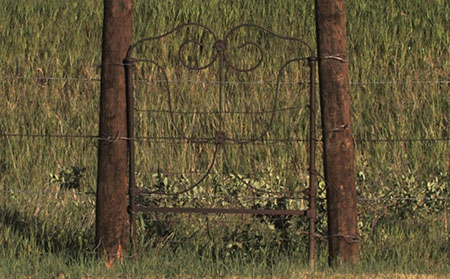Nothing was Wasted

A Bedframe Used as a Gate
The Hutmacher homestead holds many examples of how items we would toss could be used for a second purpose.
Even the most environmentally conscious among us would be put to shame by how little was wasted by the early pioneers.
Empty spools of thread would become coat hooks or cabinet pulls. Wooden crates were repurposed as storage cabinets. Used canning lids became washers to hold up the cardboard used for interior ceilings.
The local trading store had a limited inventory of items to purchase. Traveling to a larger town that offered a wider variety of goods happened infrequently. While items could be purchased by mail order, the family would often forego purchases if there were a way of making do.
But lack of access to goods and services is only part of the story. Money saved by making do could buy a cow that would build up the herd or wire for a fence that would increase the grazing land or another horse that would allow more land to be cultivated.
These decisions reflect a willingness to forego having nicer things now, in order to build a better life in the future for themselves and the next generation.
Nothing was Wasted

